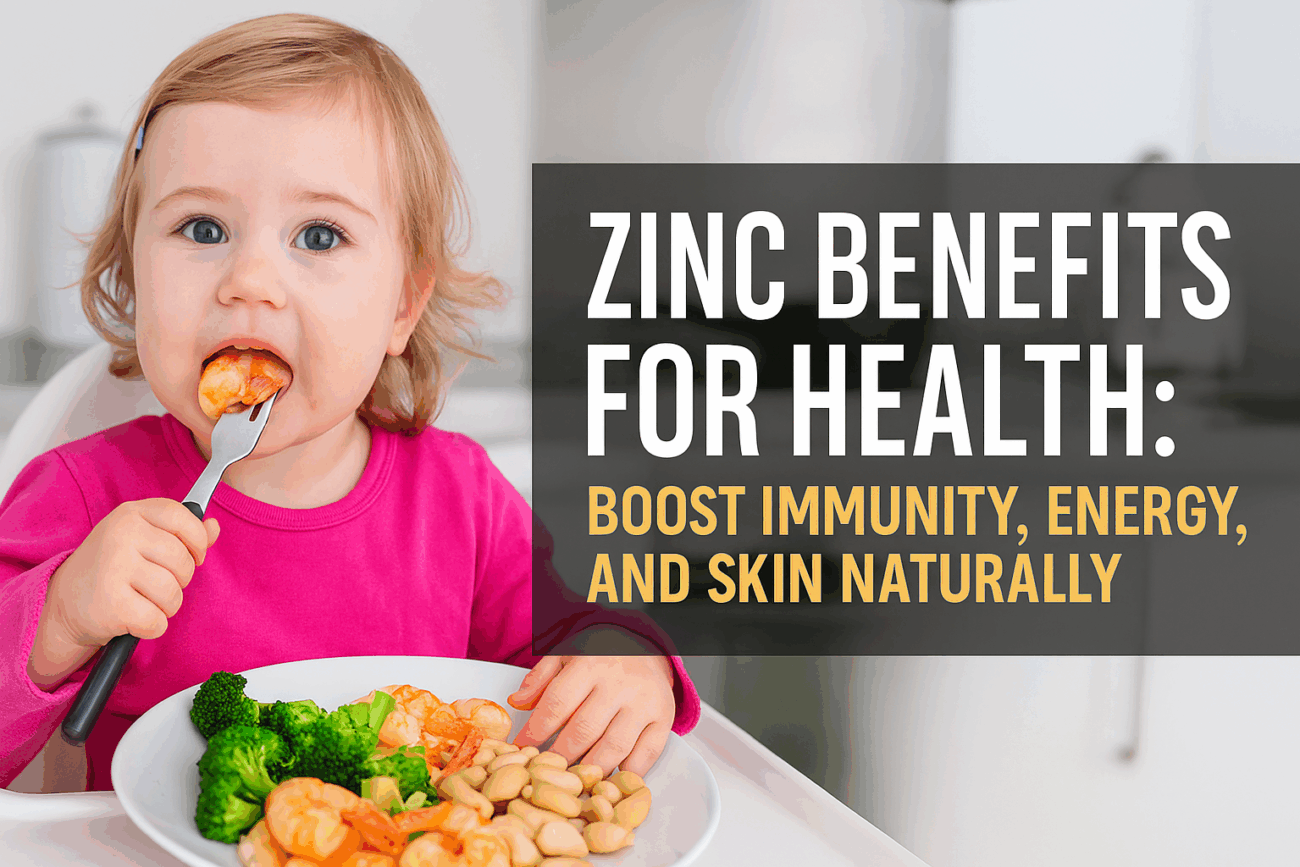🧲 Introduction: Is Zinc the Missing Link in Your Health?
Feeling tired all the time? Catching colds too often? Dealing with breakouts that won’t go away?
It might not just be stress, it could be a zinc deficiency.
Zinc benefits for health go far beyond what most people realize. This essential yet often overlooked mineral powers your immune system, boosts energy levels, supports metabolism, and keeps your skin and hair healthy.
But here’s the catch: your body can’t store zinc, so you need a steady daily intake. Without enough zinc, your health, energy, and even mood can take a serious hit.
If you’ve ever felt constantly drained, struggled to fight off infections, or noticed issues with your skin or mood — this guide is for you.
You’ll discover:
- Zinc benefits for health that most people miss
- How much zinc per day you really need
- Zinc-rich vegetarian foods and animal-based options
- Signs of zinc deficiency and how to fix it
- Best zinc supplements and how to use them wisely
Let’s unlock your energy, focus, and immune strength — one mineral at a time.
🛡️ 1. Zinc for Immunity: Your Body’s Natural Defense Booster
Zinc is essential for your immune system. It helps create white blood cells that fight infections and viruses. Without it, your body becomes more vulnerable and healing slows down.
📌 Quick Tip: If you’re constantly sick or feel run down, try eating more foods high in zinc like chickpeas, pumpkin seeds, or lean beef.
💪 2. Zinc for Energy and Metabolism: Your Natural Power Source
Zinc helps convert nutrients into energy and supports thyroid function. A deficiency can make you feel weak, tired, or mentally foggy.
🥗 Power Move: Add cooked lentils, sunflower seeds, or fortified cereals to your meals for a clean energy boost.
✨ 3. Zinc for Skin and Hair: Glow from Within
Zinc reduces inflammation, speeds up tissue repair, and helps manage acne and skin irritation. It also supports hair growth and prevents dandruff.
🧴 Fun Fact: Zinc works best for skin and hair health when consumed consistently through natural sources of zinc.
🚨 4. Zinc Deficiency Symptoms: What Does Zinc Do for Your Body?
Your body gives warning signs when it’s low on zinc. Look out for:
- Constant infections or slow wound healing
- Low energy or poor concentration
- Hair thinning or brittle nails
- Skin problems (acne, rashes)
- Loss of taste or smell
👩⚕️ If these sound familiar, ask your doctor about checking your zinc levels. It could make a world of difference.
🥩 5. Foods High in Zinc: What to Eat Daily
| Food | Zinc (mg per serving) | Why It’s Great |
|---|---|---|
| Oysters | 32 mg (6 oysters) | Ultimate immune boost |
| Beef | 7 mg (3 oz) | High bioavailability + iron combo |
| Pumpkin seeds | 2.2 mg (1 oz) | Vegan-friendly + rich in minerals |
| Chickpeas | 1.3 mg (1/2 cup) | Plant-based protein + zinc |
| Cashews | 1.6 mg (1 oz) | Easy snack with zinc power |
| Fortified cereals | 3.8–11 mg | Quick, convenient source |
🧡 Women need about 8 mg of zinc daily. Get a mix of sources to meet your needs.
🌱 6. Zinc-Rich Vegetarian Foods: Plant-Based and Powerful
If you don’t eat meat, don’t worry — you can still hit your zinc goals:
- Tofu with sesame, spinach, and garlic
- Lentil soup with lemon (Vitamin C improves zinc absorption)
- Oatmeal with pumpkin seeds and berries
🌿 Soak or sprout legumes and grains to boost zinc availability.
🚫 7. Common Mistakes That Block Zinc Absorption
Even if you eat enough zinc, some habits can block your body from absorbing it:
- Taking calcium or iron supplements at the same time
- Drinking alcohol regularly
- Relying on raw legumes and grains (high in phytates)
- Using antacids too often
⚖️ Fix It: Time your minerals right and pair zinc foods with Vitamin C for better results.
📏 8. How Much Zinc Per Day? (By Age and Gender)
| Group | Daily Need |
| Kids (9–13) | 8 mg |
| Teens | 9–11 mg |
| Adult Women | 8 mg |
| Adult Men | 11 mg |
| Pregnant Women | 11–12 mg |
| Breastfeeding | 12–13 mg |
📌 Stick to the recommended dose unless your doctor advises more. Overdosing can cause nausea and other issues.
💊 9. Best Zinc Supplements: When and What to Choose
If you’re not meeting your needs through diet, supplements can help. Choose high-absorption options like:
- Gluconate
- Picolinate
- Citrate
💡 Avoid high-dose zinc supplements unless prescribed. Always take them with food.
📋 Ideal for:
- People recovering from illness
- Vegetarians and vegans
- Individuals with absorption issues
✅ Conclusion: Make Zinc Part of Your Daily Wellness Routine
Zinc may be a small mineral, but the zinc benefits for health are truly massive.
From strengthening your immune system and increasing energy levels to enhancing skin health and supporting overall well-being. Zinc is a must-have nutrient for daily vitality.
📝 To recap:
- Eat a variety of zinc-rich foods, both animal and plant-based
- Watch out for zinc deficiency symptoms
- Understand how much zinc per day is right for your age
- Only use zinc supplements if needed
🌟 Ready to boost your health naturally? 👉 Add one zinc-packed food to your meal today and feel the difference.
Read more about:
10 Evidence-Based Health Benefits of Magnesium
Foods High in Iron for Women
How exercise boosts immunity
National Institutes of Health (NIH) – Zinc Fact Sheet
Harvard T.H. Chan School of Public Health – The Nutrition Source: Zinc
Healthline – Zinc: Benefits, Dosage, Foods, and Side Effects
Mayo Clinic – Zinc Supplements: Uses and Precautions


i m in love wd this one